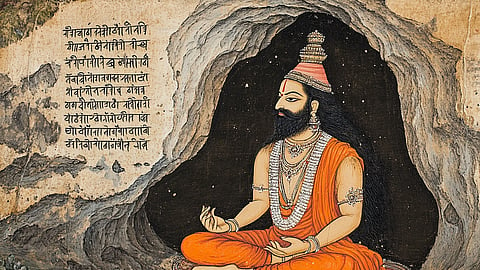- Commentary
- History Vignettes
- Notes on Culture
- Dispatches
- Podcasts
- Indian LanguagesIndian Languages
- Support

TRADITION WOULD HAVE US believe that Bhartrhari was not only a poet, but also a grammarian and a metaphysician. Grammar is of course a part of the necessary equipment of a poet in Sanskrit; and he must have too philosophy of some kind.
But Bhartrhari is represented as an authority in those two departments of knowledge. Vakyapadiya is the work of grammar ascribed to him. But there are scholars who think that there are more Bhartrharis than one figuring in Indian history and that the author of Vakyapadiya is not to be identified with the author of the celebrated Shatakas. Bhartrhari, our poet, has the reputation of having been a great exponent of the Advaita Vedanta in the pre- Shankara period. If he wrote any work on the Advaita philosophy, I have not been able to find it out.
To me Bhartrhari is, for the present talk, the writer of the three great Shatakas on Niti or Morals, Shrngara or Erotics and Vairagya or Non-attachment.
A Shataka, as you know, is a century of stanzas, a collection of a hundred poems. Shatakas are common in the Telugu language, and we have some in Kannada also. They generally are emotionalized reflections on life and God and the ways of the world and the ways of Destiny.
With regard to the Shatakas of Bhartrhari, we are in great difficulty as to the authenticity of the text. We had occasion to look into four different editions in the course of our study here; and there are many more editions. Opinion is divided among scholars not only as to the admissibility of some scores of verses, but also as to the readings of many of the verses admitted.
Some would go so far as to suggest that Bhartrhari has incorporated into his work verses of previous writers enjoying popularity in his time. We here are concerned more with the verses than with their authorship and more with their general tenor and purport than with their textual detail.
The general reader, who is not a scholar with specialized knowledge, may find any Bombay or Madras edition good enough for his limited purpose.
Bhartrhari’s work is also known as Subhashita. He himself seems to prefer that word: jirnam ange subhashitam — he says. Subhashita means “what is well spoken,” “a good saying.”
Sukti is a synonym for it. It is a maxim or aphorism or epigram. I would call it an epigram because it is poetical in form and purpose and is characterized by brevity, pithiness and pointedness which are the marks of an epigram. Sanskrit is rich in epigrammatic literature.
What is literature? It is the expression in effective language of a movingly beautiful feeling or a movingly deep thought. The moment you grasp the word it must move you. The phrase must haunt your memory and the sense must work upon your heart.
If this be the test of literature, I hold that Bhartrhari stands it well. He has stood it triumphantly for some fifteen centuries. For generation after generation, he has been the unrivalled king of the realm of subhashita. His greatness in his own province has been admitted by all subsequent Sanskrit writers and he has had translators in all the principal Indian languages.
Niti is a comprehensive word meaning proper conduct, relationship, attitude, adjustment, policy, expediency, prudence and every other consideration that enters into the right management of the business of life. We may for brevity translate it as “the conduct of life.”
The hundred verses devoted to this topic are generally counted the first part of Bhartrhari’s work.
He begins in a mood of complaint:
बोद्धारो मत्सरग्रस्ता: प्रभव: स्मयदूषिता: ।
अबोधोपहाताश्चान्ये जीर्णमंगेसुभाषितम् ।।
“Those who should teach are consumed with jealousy; the rich are drowned in arrogance; the rest are lost in the darkness of ignorance. The good saying dies unborn in one’s own breast.”
So discouraging were the times to literature and culture. The learned were distracted by their own mutual rivalries and pugnacities. Those in seats of power had no appreciation of letters and learning. The common crowd was not to be expected to evince interest in questions of the refinement of conduct and enrichment of mind. It was also a day of men of little learning, — men who imagined themselves wise, having given themselves over to prejudice and to fanaticism and closed their minds to new light. Bhartrhari reverts to this topic again and again:
ज्ञान-लव-दुर्विदग्धं ब्रह्मापि नरं न रञ्जयति ॥
“Even Brahma the creator cannot bring enlightenment and satisfac- tion to the half-educated man who esteems himself as learned and wise.”
न तु प्रतिनिविष्टमूर्खजनचित्तमाराधयेत् ॥
"It is impossible to persuade the man who has made up his mind in prejudice and is obstinate in his perversity.”
In another place in the work Bhartrhari declares his faith in the identity of Shiva and Vishnu and that verse hints at the prevalence of religious bigotry among his contemporaries. Altogether it seems to have been an age of people of types familiar to us elsewhere as Sophists and Philistines and Mammonites.
Series concluded
The Dharma Dispatch is now available on Telegram! For original and insightful narratives on Indian Culture and History, subscribe to us on Telegram.
